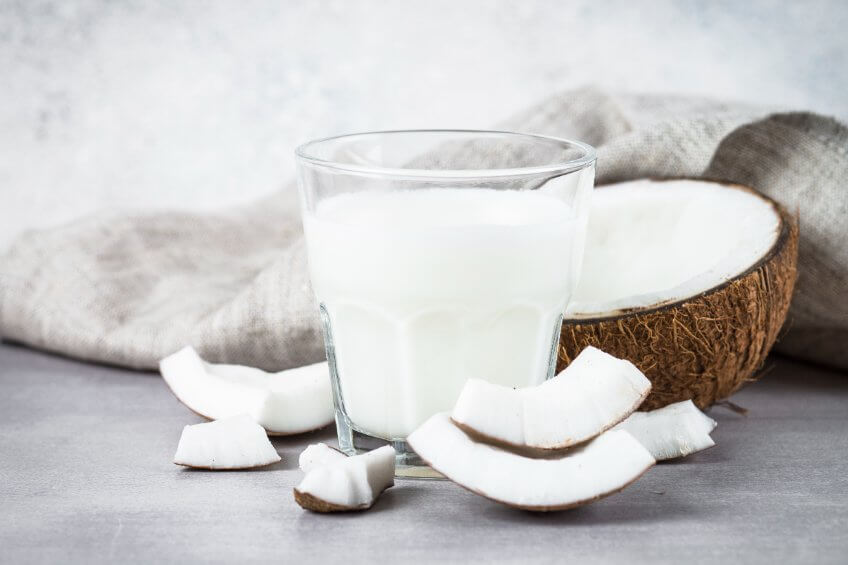If you’re making smoothies or mixed drinks then you may find yourself looking for creative ways to add flavor and creaminess to your concoctions. Both coconut milk and orange juice have much to offer in this regard, but the nutritional contents of each couldn’t be more different. In this article we’ll be examining all of the differences between coconut milk vs orange juice so you can compare and make an educated decision for yourself.
In short, the main difference between coconut milk vs orange juice is that coconut milk has a creamier consistency but is high in saturated fat. Orange juice, on the other hand, has a sweeter taste and is packed with vitamin C, but contains more sugar.
The differences between the two couldn’t be greater, nor could the implications of consuming them. Let’s have a closer look.
All About Coconut Milk
Coconut milk is a plant-based milk alternative that is made from the pressed flesh of a coconut. The result is a milky-white liquid with a creamy consistency.

Coconut milk is a popular choice among vegans and vegetarians as it has a creamier consistency than most other plant-based milk alternatives and froths better as well.
What It’s Used For
One of the biggest differences between coconut milk and orange juice is how they’re used. Coconut milk is commonly used in the following ways:
- Added to smoothies and mixed drinks for coconut flavor and a creamier consistency
- Used in cereal and oatmeal as an alternative to dairy milk
- As a substitute for dairy milk when baking
- Used to make milkshakes and ice cream
- Enjoyed on its own as a beverage
What About Orange Juice?
Much like coconut milk, orange juice is also the byproduct of pressed fruit. In this instance, however, oranges are sliced and pressed to extract the sweet liquid inside.

Often sold bottled or by concentrate, orange juice is a popular breakfast beverage due to its sweet, citric flavor and various health benefits. According to WebMD, those benefits include improved immune health, reduced risk of kidney stones, and more.
That said, orange juice is not without its downsides. Due to its high concentration of sugar, orange juice can be just as bad for your teeth as soda, according to Contemporary Dentistry. Orange juice is also highly acidic and can aggravate acid reflux, says Healthline.
Coconut milk, on the other hand, does not contain sugar or acid.
What It’s Used For
Although orange juice is most commonly consumed as a breakfast beverage, it can also be used in other ways, such as:
- Adding sweetness to smoothies and mixed drinks
- In baking recipes to add sweetness and a citric flavor
- Made into ice pops
- As a marinade
Coconut Milk VS Orange Juice
Now that we’ve gone over the practical differences between coconut milk and orange juice, let’s have a closer look at how they compare.
Difference In Taste
To say that coconut milk and orange juice differ in taste would be an understatement.
Coconut milk has a mild, coconut flavor. This makes it unique from other plant-based milk alternatives which tend to have more of a neutral taste.
Orange juice, on the other hand, has a strong citric flavor that can sometimes be tart or bitter depending on the oranges used to make it, as well as their ripeness.
Texture & Consistency
Not only do these two tropical beverages differ in taste, but they’re also very different when it comes to texture and consistency.
Coconut milk is smooth and creamy, whereas orange juice has more of a liquid consistency and sometimes contains little bits of flesh from the orange fruit known as pulp.
This means that coconut milk and orange juice will have vastly different impacts in recipes where they’re used as an ingredient.
Storage & Shelf Life
Both coconut milk and orange will require refrigeration if you wish to store them.
Coconut milk should be refrigerated after opening, according to the “Does It Go Bad” website. It can last anywhere from 5 to 10 days when properly stored.
Orange juice that has been freshly squeezed can last in the fridge for up to 3 days if stored in an airtight bottle or container. Bottle orange juice and orange juice concentrate products will have their expiration dates stamped on them.
Pet Safety
As far as pet safety goes, coconut milk is generally safe for dogs and may even have some health benefits, according to Rover.com. Orange juice, on the other hand, should be avoided due to its high sugar and acidic content.
Nutritional Differences
Now let’s have a look at some of the nutritional differences between coconut milk vs orange juice.
The table below compares a 1-cup serving of the Silk brand of unsweetened coconut milk with an equal serving size of fresh-squeezed orange juice:
| Item | Coconut Milk | Orange Juice |
 |
 |
|
| Serving Size | 1 Cup | 1 Cup |
| Calories | 40 | 112 |
| Total Fat | 4g | 0.5g |
| Saturated Fat | 4g | 0.1g |
| Cholesterol | 0mg | 0mg |
| Total Carbohydrate | 2g | 26g |
| Dietary Fiber | 0g | 0.5g |
| Total Sugars | 0g | 21g |
| Protein | 0g | 1.7g |
| Sodium | 45mg | 2.5mg |
| Potassium | 310mg | 496mg |
| Vitamin A | 20% DV | 3% DV |
| Vitamin B12 | 35% DV | 0% DV |
| Vitamin C | 0% DV | 138% DV |
| Vitamin D | 10% DV | 0% DV |
| Calcium | 35% DV | 2% DV |
| Iron | 2% DV | 3% DV |
As evident in the numbers, the nutritional differences between coconut milk and orange juice are quite stark. Let’s elaborate.
Coconut Milk Has Less Than Half As Many Calories As Orange Juice
One of the biggest advantages coconut milk has over orange juice is that it contains significantly fewer calories.
Calories are the unit of measurement used to gauge the energy we consume and expend, and reducing caloric intake is a great way to lose weight, according to Mayo Clinic.
A single cup of unsweetened coconut milk only has 40 calories, whereas a cup of orange juice contains 112.
Coconut Milk Also Contains Less Sugar
Another advantage coconut milk has over orange juice is that it does not contain sugar.
Orange juice, on the other hand, contains lots of it. Just a single cup packs a whopping 21 grams of sugar! What’s more, the sugar in orange juice is refined due to it being concentrated from the fruit and its fiber discarded.
Coconut Milk Contains Vitamin A
Vitamin A, otherwise known as Retinol, is an antioxidant that can help protect cells from free radical damage. According to Mayo Clinic, it plays an important role in vision, immunity, reproductive health, and more.
Those who opt for coconut milk vs orange juice will enjoy the benefit of getting 20% of the Daily Value of vitamin A from just a single cup.
Orange juice, on the other hand, only contains 3% DV.
Coconut Milk Is Fortified With Vitamin B12
Another advantage that coconut milk has to offer is that it’s fortified with vitamin B12.
Produced by bacteria, vitamin B12 plays many important roles in the body. These include DNA production, nerve cell health, and more.
Those following vegan, vegetarian, or any other kind of minimally-processed diet may struggle to consume an adequate amount of B12 through diet alone. Incorporating coconut milk can help reach your daily goals by providing 35% of the Daily Value in just a single cup.
Orange juice, by comparison, does not contain any vitamin B12.
Coconut Milk Is A Great Source Of Calcium
If you’re looking to substitute coconut milk for dairy milk then you certainly won’t be missing out on calcium.
Calcium is an essential mineral and electrolyte that helps build strong bones, and a single 1-cup serving of coconut milk provides 35% of the Daily Value of calcium.
Orange juice pales in comparison, containing only 2% DV of calcium.
Orange Juice Is Lower In Fat
One of the few nutritional advantages orange juice has over coconut milk is that it only contains half a gram of total fat per serving.
Coconut milk packs 4 grams of fat per cup. Worst yet, the fat in coconut milk is entirely saturated fat– a “bad” kind of fat that can raise LDL cholesterol, according to the American Heart Association. Increased LDL raises the risk for heart disease and stroke, says AHA.
Orange Juice Is Packed With Vitamin C
The greatest advantage orange juice has over coconut milk, in terms of nutrition anyway, is its vitamin C content.
Vitamin C is a water-soluble nutrient that acts as an antioxidant. According to the National Institutes of Health, vitamin C helps in producing collagen, supporting immune health, and iron absorption from plant-based sources.
Just a single 1-cup serving of orange juice will provide you with all of the vitamin C you need for the day and then some, clocking in at 138% of the Daily Value!
By comparison, coconut milk does not contain any vitamin C.
The Bottom Line
In conclusion, the differences between coconut milk vs orange juice are vast. Nutritionally speaking, they each come with downsides that need to be weighed against each other.
Coconut milk is packed with lots of saturated fat, which can be detrimental in various ways. Orange juice, however, is highly acidic and comes with lots of refined sugar that can be bad for your teeth. Those finding themselves feeling like they have to choose between the lesser of two evils may want to consider checking out oat milk.

